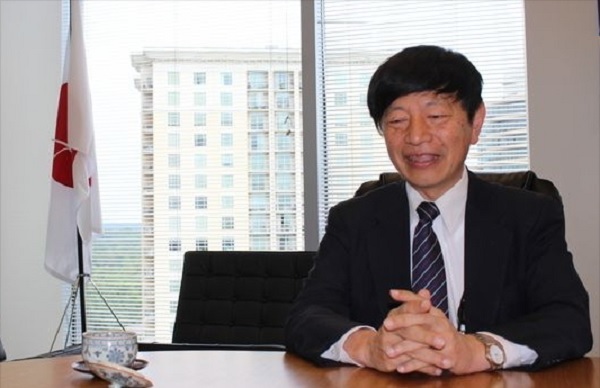Japan diplomat’s ‘paid prostitutes’ claim draws ire
By Shin Hyon-heePublished : June 27, 2017 - 15:58
A senior Japanese diplomat was found Tuesday to have portrayed the victims of wartime sexual slavery as “paid prostitutes,” drawing the ire of South Korea and adding to perennial historical tension between the countries.
Takashi Shinozuka, the Japanese consul-general in Atlanta, made the comment during an interview with a local newspaper last week as he criticized the Brookhaven City Council’s plan to raise a statue in commemoration of the “comfort women.”
The Atlanta Comfort Women Memorial Task Force, which donated the memorial to the city last month, said up to 200,000 women, mostly Koreans, were forced by the Japanese military to provide sex in front-line brothels during World War II, which is in line with the studies by Korean and many other international scholars.
Takashi Shinozuka, the Japanese consul-general in Atlanta, made the comment during an interview with a local newspaper last week as he criticized the Brookhaven City Council’s plan to raise a statue in commemoration of the “comfort women.”
The Atlanta Comfort Women Memorial Task Force, which donated the memorial to the city last month, said up to 200,000 women, mostly Koreans, were forced by the Japanese military to provide sex in front-line brothels during World War II, which is in line with the studies by Korean and many other international scholars.

Shinozuka, however, argued there is “no evidence,” stressing that in Asian culture, women sometimes become prostitutes to help feed their families.
“There were not 200,000 women, they were not sex slaves, and they were not taken by force,” he was quoted as saying by the Reporter Newspapers, calling them “paid prostitutes.”
He urged the project to be tabled, though the city said it would not do so. The memorial is scheduled to be unveiled on June 30 at a public park there.
“This is not a simple art object,” he said. “This is a symbol of hatred and resentment against Japan.”
Seoul’s Foreign Ministry called Shinozuka’s claim “unbelievable” and “extremely inappropriate,” saying it would lodge a complaint and urge its withdrawal after verifying it.
“If the report is true, it is hard to believe a high-level diplomat made such comments,” ministry spokesperson Cho June-hyuck said at a news briefing Tuesday.
“It would be extremely inappropriate remarks that run counter to the international community’s shared view that the comfort women issue is about wartime sexual violence and a grave human rights violation.”
The interview is the latest in an ongoing series of attempts by Tokyo officials and politicians to whitewash the country’s imperial past and wartime atrocities.
This has complicated Seoul’s efforts to improve relations with its neighbor that has now become a crucial economic and security partner, in particular intensifying South Koreans’ resistance toward a 2015 settlement with Tokyo.
Under the deal, the Japanese Prime Minister offered an apology and his administration provided 1 billion yen ($9 million) to help set up a fund here for the victims. But some of the survivors rigorously reject it, questioning Tokyo’s sincerity and demanding Seoul return the money.
President Moon Jae-in, who has vowed to renegotiate the accord on the campaign trail, is seeking ways to improve the settlement to the satisfaction of the victims without reneging on it.
In Washington, Rep. Ed Royce, chair of the House Foreign Affairs Committee, said at the Korean American Leaders Conference that Tokyo should teach its young generation about the history of human rights abuses including the sexual slavery, instead of concealing it, taking a page from Germany which has acknowledged and currently educates on its past wrongdoings.
By Shin Hyon-hee (heeshin@heraldcorp.com)


![[Exclusive] Korean military set to ban iPhones over 'security' concerns](http://res.heraldm.com/phpwas/restmb_idxmake.php?idx=644&simg=/content/image/2024/04/23/20240423050599_0.jpg&u=20240423183955)

![[Graphic News] 77% of young Koreans still financially dependent](http://res.heraldm.com/phpwas/restmb_idxmake.php?idx=644&simg=/content/image/2024/04/22/20240422050762_0.gif&u=)



![[Pressure points] Leggings in public: Fashion statement or social faux pas?](http://res.heraldm.com/phpwas/restmb_idxmake.php?idx=644&simg=/content/image/2024/04/23/20240423050669_0.jpg&u=)









